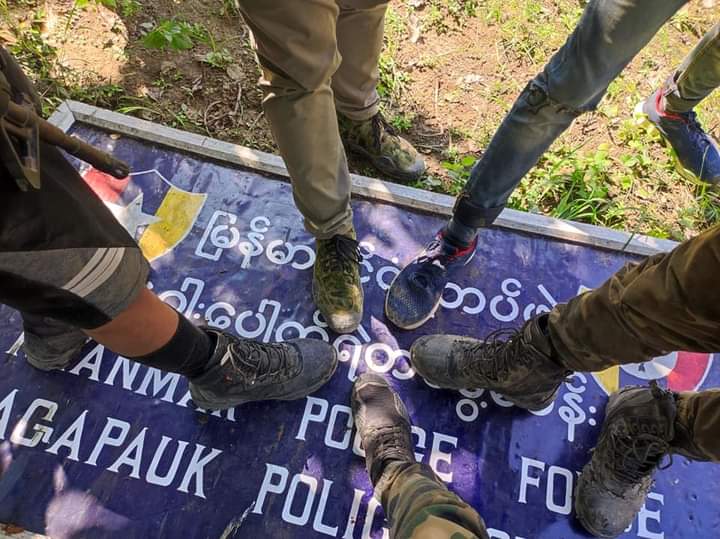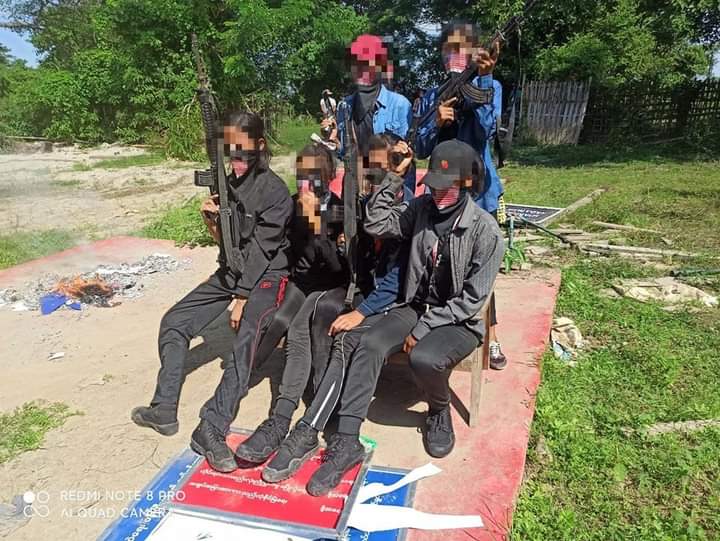Under the hot afternoon sun in Burma’s dry zone, a call rings out into the clearing.
The revolution must succeed.
The call is met with the resounding voices of 20 women:
The revolution must be successful.
The women move in sync, crawling low in their camouflage uniforms, holding a long stick in place of a gun—soon they will begin firearms training. As the dust swirls in the hot air, they move through exercises without complaint; rolling with arms prostrate to their chest to escape gunfire, carrying out synchronized marching drills through the streets of Sagaing’s rural Myaung township. Historically known for its scattered pagodas, built as fledgling worship spots on the way to Bagan, recent violence is causing many to rethink the role of tradition in the shadow of the basin’s Kyauk Nagar Mountain.
The fighters are far from the only People’s Defense Force in Burma’s heartland, but they are set apart—Myaung Women Warriors (MWW) is an all-female guerilla group.
Amara, a 29-year-old self-dubbed “woman warrior,” says that she never imagined her simple childhood would turn her into an armed revolutionary—but she’s no stranger to hard work.
“I was a tough girl and used to hard labor since I was raised a peasant. However, there are many differences between a simple village girl and an armed woman.”
Growing up, the words that now color Burma’s Spring Revolution had yet to infiltrate her quiet agricultural life: “human rights”, “justice”, “freedom”—they were new things, things that had to be learned, she says.
Before joining MWW, its volunteers, aged 16 to 45, knew little of a soldier’s life. Of her old life, Amara speaks idyllically of the rhythms of the seasons, of rising with the sun, carefree of most natural disasters or conflicts. Others, including teachers, students, and healthcare professionals were equally naive of war; when Amara and many others from Sagaing’s villages decided to join the armed group, drills were not the only thing they needed to ready themselves for.
“We have to prepare our minds first. We have to reflect on ourselves—on every experience—and channel our emotions into convictions,” she said of her two-month training, wherein recruits immerse themselves in the past missions and actions of revolutionary groups.
Like many armed groups, Amara says members quickly grew frustrated with the inefficacy of peaceful protests in the city of Myaung. As the organization began to form, some families assuredly released their daughters and wives to join the movement to fight the regime. Others, stuck in what Amara calls the “old traditions and taboos against females”, had to be convinced that their support was vital to the revolution.
At times, Amara admits, she questioned whether her actions were appropriate for a woman. Ultimately, her resolve to change Burma’s future gave her hope. Doing nothing, after decades of oppression, was simply not an option.
“We are young people and we have to take our future back,” she said. “This is our duty. For me, it’s been two months since I left home—I gave my word to my family that I’ll be home with the victory.”

***
Many of those leaving their homes soon found that the life of a female PDF soldier was, in practise, less sacrificial than originally anticipated; when soldiers left for battle or drills, the hands that women had imagined would be gripping triggers end up scrubbing plates, chopping garlic, and serving hungry male mouths.
With traditional attitudes prevalent across rural Sagaing, not everyone is convinced that women belong on the frontlines. Across the country, female recruits have reported being barred from leadership roles within their PDFs; although some are happy to serve in supporting roles, others are less content staying within the confines of a jungle kitchen.
Amara says that this parochial attitude toward women in combat zones provides Myaung Women Warriors with its raison d’etre: to give women an equal opportunity to fight back.
“It’s simply not a fact that if women are involved in operations that we will fail,” she said. “We have to fight against it, get out of the mindset. These confines are obstacles to the achievement of womens’ rights. That’s why we formed our group, to boost womens’ power and further gender equality.”
So far, the group’s record has certainly proven that Myaung’s women can achieve the same results as their male-dominated PDF neighbors. When pushed on recent operations, Amara modestly admits that MWW has yet to participate in face-to-face combat with the military.
“However,” she proclaims, “we did eliminate a number of military informants, destroy Mytel transmission towers, raid police stations, attack a military convoy with landmines… and “give a lesson” to a dalan (military informant) after breaking into his house.”
Clearly, a not-too-shabby list of revolutionary achievements for a group whose inception was just last month.
Although currently one-of-a-kind, the group is far from isolated. What began as a band of just ten women now has nine alliances across the region, including prominent resistance groups, the Burmese Guerilla Force (BGF), Myaung Union Army, Good Hearted Guys, MGN Tiger, and MGN Ranger. Amara says that her group has a secure supply of weapons and funding from the Civilians Defense and Security Myaung-PDF, in addition to receiving funding and donations from local supporters.
These relationships have helped MWW execute its more violent missions whilst also keeping an eye on providing assistance to civilians living within its territories—people who now count amongst Burma’s most persecuted.
Despite the initial uncertainty, MWW has found its footing among Burma’s revolutionaries. Amara says the group plans to continue to engage in combat operations and the planting of explosions, as well as caring for refugees and providing healthcare to the region’s displaced persons.
“We were nervous, like, are we following the right path? Are we doing this until the end?” she asked herself. “We were afraid of taking other people’s lives by using guns. However, everything is now fragile when we compare it to the most painful and hateful things that the junta did to us.”



